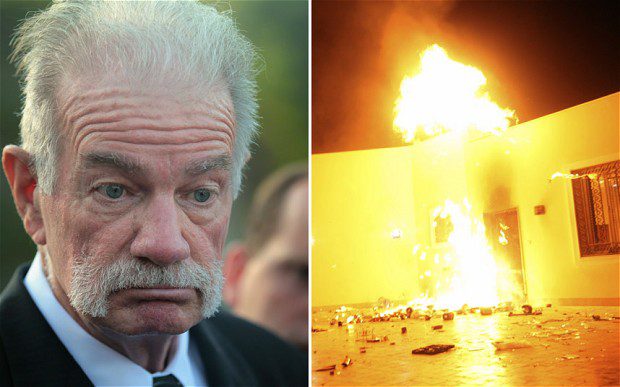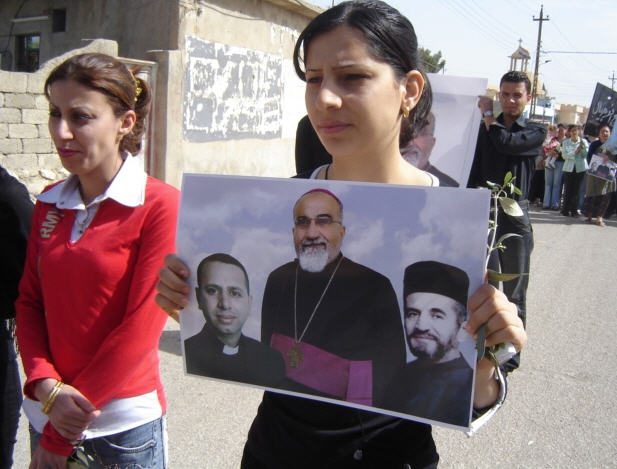As most of my readers will already know, anti-American protests have erupted in Egypt, Libya and elsewhere, sparked by a low-budget film called “The Innocence of Muslims,” which was produced by Israeli-American real estate developer Sam Bacile to show the “hypocrisies” of Islam. The protests in Libya led to the death of the American ambassador to Libya, Christopher Stevens, as well as three others, including two Marines. The ambassador’s body was paraded around by the rioters, in what has become an all-too-familiar sight from Somalia to Baghdad to Tripoli, before it was recovered and put en route back to the United States.
The Innocence of Muslims Provokes Violence from Muslims
This appears to be the timeline. Amateur filmmaker Sam Bacile raised $5 million from roughly 100 Jewish donors, produced the film over the course of three months with 60 actors and 45 crew, and the film arrived to the sound of crickets. Bacile hoped that the film would promote the cause of Israel by revealing Islam’s hypocrisies and fraud to the world. Although he was told that he would become the next Theo van Gogh, and understood that the wildly provocative film would likely spark a backlash, he went ahead with it anyway. It premiered earlier this year, however, to a largely empty theater in Hollywood. The full-length trailer was posted on YouTube in July, and no one seems to have noticed.
Last week, an Egyptian American Copt, Morris Sadek, who has frequently denounced Islam in the past, blogged about the movie, a Cairo newspaper and Egyptian television station took notice of the film and attributed it to Egyptian American Christians in Washington. A segment of the film was shown, and the host, Sheikh Khaled Abdalla, denounced the Copts. As the New York Times reports:
Last year, the Egyptian-British journalist and blogger Sarah Carr wrote, “Sheikh Khaled Abdalla is part of a school of particularly shrill religious demagogues who turn every possible event into an attack on Islam.” She added that Sheikh Khaled regularly attacked Egypt’s Coptic Christian community.
So a hard-core Egyptian Islamist demagogue takes a movie produced by Israeli-American Jews and makes it an occasion to attack Coptic Christians — and the conflagration grew from there. Protests erupted first in Cairo and then in Tripoli. Mixed amongst the anti-American slogans were pro-al-Qaeda chants, and the name of Osama bin Laden was scrawled on the wall of the embassy in Cairo. This took place, awkwardly but presumably not coincidentally, on the anniversary of 9/11. It was in the midst of the protests in Tripoli that ambassador Stevens was killed. The filmmaker, Sam Bacile, is now in hiding, criticizing the embassy security but insisting defiantly that Islam is a “cancer” and the world should know the truth.
 The Role of Terry Jones
The Role of Terry Jones
Somehow the name of Terry Jones, the once-obscure fundamentalist Floridian “pastor” who made headlines around the world with his determination to burn copies of the Koran, gets mixed into this. The curious thing? It’s not exactly clear that Terry Jones had anything to do with it. The Coptic blogger, Sadek, had recently met Terry Jones and joined him in an anti-Islamic protest in Washington in June. Beyond that, it’s unclear whether Jones knew of the film or intended to promote it, until now.
The New York Times seems intent to weave Terry Jones’ name throughout the story, but it reports:
Reached by telephone in Florida, a representative of Mr. Jones seemed unaware of the film, but hours later the pastor sent The Lede a statement by e-mail in which he complained of the attack on the embassy in Cairo and announced plans to screen the trailer for the film on Tuesday night. He said that it “reveals in a satirical fashion the life of Muhammad.”
Clearly Jones had nothing to do with the production of the film. The Times describes him as an “ally” of Sadek, although it may be the case they only just met in July. There’s also no evidence that Jones had any intention of screening the film until it exploded.
So what exactly is the role of Jones here — apart from serving as a convenient way to tie in “evangelicals” (although Jones and his tiny congregation are probably better described as fundamentalists)? As far as we know, Christians had nothing to do with the film until a Coptic blogger referenced it, and presented a demagogue like Abdalla with an equally convenient chance to demonize Christians in Egypt.
Put bluntly, and I say this as a big fan of Judaism: somehow, Christians seem to be taking a lion’s share of the violent hatred for a movie produced by Jews. A typical title says: “Terry Jones: Florida pastor linked to Libya protests.” By implication, that crazed evangelical Terry Jones (who, by the way, I’ve strongly criticized in the past) is tossed into the mix of the people who have blood on their hands for the death of ambassador Stevens, even though Jones doesn’t seem to have done anything to promote the film prior to Stevens’ death. How is this happening?
A part of the answer — and this is where Jones’ responsibility becomes crystal clear — is the alacrity with which Jones has seized the spotlight suddenly thrust in his direction. Jones is responsible for what he does henceforth.
From what I’ve seen of the film, it’s an amateurish production that presents a caricature of Mohammad and his followers. I have no objection to criticisms of Islam and its founding. The most conservative elements of the Muslim world must learn that living in the modern world means that your beliefs, even your religious beliefs, are open to criticism from scholars and from anyone who wants to make a movie. The proper response to such criticism is rebuttal, not violence. At the same time, Christians need to treat others’ most sacred beliefs with extraordinary care. They are right to speak the truth as they perceive it, but they must do so with abundant grace, and they must make sure that their construal of others’ beliefs is rigorously honest and accurate, not exaggerated or distorted and not unnecessarily inflammatory.
If Jones shows love for Muslims and a respectful, careful criticism of their beliefs, then he could have a beneficent influence. If he promotes a cartoonish caricature of the origins of Islam that does nothing to enlighten but only insults, then he will be guilty of stoking the flames.












